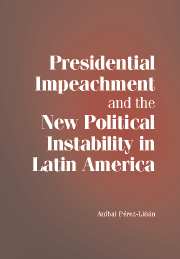Book contents
- Frontmatter
- Contents
- List of Tables and Figures
- Preface and Acknowledgments
- 1 INSTITUTIONAL CRISES IN PRESIDENTIAL REGIMES
- 2 FIVE CASES OF IMPEACHMENT AND A PRESUMED MADMAN
- 3 PRESIDENTIAL CRISES AND THE DECLINE OF MILITARY INTERVENTION
- 4 LATIN AMERICA IN THE AGE OF SCANDAL
- 5 SCANDALS AND THE POLITICAL ECONOMY OF POPULAR OUTRAGE
- 6 BUILDING A LEGISLATIVE SHIELD: THE INSTITUTIONAL DETERMINANTS OF IMPEACHMENT
- 7 TOWARD A NEW PATTERN OF POLITICAL INSTABILITY
- 8 RETHINKING LATIN AMERICAN PRESIDENTIALISM
- References
- Index
- Titles in the series
- References
References
Published online by Cambridge University Press: 25 July 2009
- Frontmatter
- Contents
- List of Tables and Figures
- Preface and Acknowledgments
- 1 INSTITUTIONAL CRISES IN PRESIDENTIAL REGIMES
- 2 FIVE CASES OF IMPEACHMENT AND A PRESUMED MADMAN
- 3 PRESIDENTIAL CRISES AND THE DECLINE OF MILITARY INTERVENTION
- 4 LATIN AMERICA IN THE AGE OF SCANDAL
- 5 SCANDALS AND THE POLITICAL ECONOMY OF POPULAR OUTRAGE
- 6 BUILDING A LEGISLATIVE SHIELD: THE INSTITUTIONAL DETERMINANTS OF IMPEACHMENT
- 7 TOWARD A NEW PATTERN OF POLITICAL INSTABILITY
- 8 RETHINKING LATIN AMERICAN PRESIDENTIALISM
- References
- Index
- Titles in the series
- References
Summary

- Type
- Chapter
- Information
- Publisher: Cambridge University PressPrint publication year: 2007



